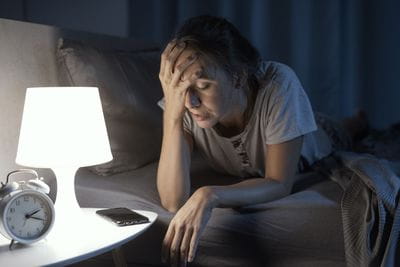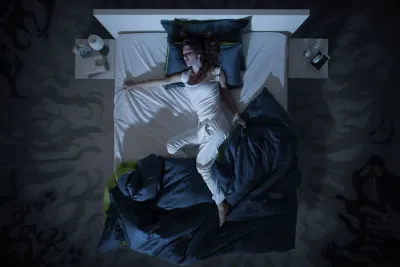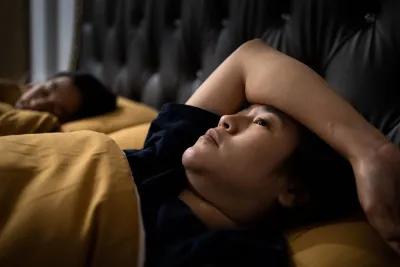Sleep Better with Anxiety: Tips & Strategies
Ana Marie Schick: Resident Sleep Expert and Certified Health Coach • Aug 13, 2024

Key Takeaways
Anxiety and sleep are tightly connected, with each one influencing the other in ways that can quickly spiral without the right support.
- Anxiety can make it harder to fall asleep and stay asleep, while ongoing sleep loss can intensify anxious thoughts and emotional reactivity.
- Racing thoughts at night are driven by the brain’s alert system staying switched on, making it difficult to relax when the body needs rest.
- Cooling the sleep environment can help signal the body that it is safe to rest, supporting faster sleep onset and fewer nighttime awakenings.
- Lowering core body temperature has been shown to support deeper sleep, even when stress or anxiety is present.
- Tracking sleep patterns can reveal how anxiety affects sleep quality and help guide adjustments that support calmer nights.
In the quiet hours of the night, when the world slows, and silence reigns, our minds should ideally slip into the soothing arms of sleep.
However, rather than experiencing these moments of peace, many of us are plagued by a rush of thoughts, worries, and anxieties that refuse to subside even when the lights are dimmed.
Anxiety can turn our beds into battlefields, impacting both the quantity and quality of our sleep. It leads to poor sleep by causing insomnia, sleep disturbances, and sleep anxiety, which in turn can instigate or worsen anxiety disorders.
Understanding the complex relationship between anxiety and poor sleep is crucial in order to attain peaceful nights and achieve a healthy and fulfilling life balance.
We will discuss strategies to calm our racing minds, prepare ourselves for sleep, and explore how anxiety affects our sleep patterns. We all deserve restorative sleep.
Understanding Anxiety Disorders and Sleep
Anxiety isn’t just everyday stress—it’s an ongoing state of worry that can spill into every part of life. And instead of sleep fixing it, anxiety often makes quality rest even harder to get. Generalized Anxiety Disorder is a prime example, marked by constant, excessive worry over day-to-day concerns. [1]
A restless mind that won’t switch off at night and an exhausted body struggling to function the next day.
Anxiety often feels like an inner alarm system that goes off constantly, alerting you to danger even when there is none.
Common anxiety symptoms include racing thoughts, increased heart rate, excessive sweating, rapid breathing, and an overwhelming sense of dread.
When it’s time to settle in for the night, anxiety can follow you to bed. Instead of quickly falling into a deep sleep, people with anxiety often get stuck in a cycle of overthinking and worrying. This mental state can make it incredibly difficult to fall asleep.
The constant stream of thoughts can cause sleep onset insomnia and other sleep problems or sleep disorders. Anxiety disorders, including generalized anxiety disorder, are closely linked to serious sleep disturbances such as insomnia, affecting vivid dreaming, provoking nightmares, and creating a higher likelihood of sleep disruptions.
Anxiety can have a lasting effect on sleep, even after you’ve fallen asleep. Sleep can be disrupted by anxiety, causing you to wake up frequently. This is known as sleep maintenance insomnia, making it difficult to stay asleep even if you manage to fall asleep.
You may wake up multiple times throughout the night or much earlier than intended and find it challenging to fall back asleep.
Anxiety isn’t just “in your head”—it affects your body too. When it goes unchecked, it can raise blood pressure, weaken your immune system, and even increase the risk of heart problems. On the mental side, it often fuels depression, burnout, and restless nights.
The link between anxiety, poor sleep, and mental health is a tight one, which is why managing stress isn’t just nice to have—it’s a must. By keeping anxiety in check, you set yourself up for better sleep, sharper focus, and a healthier, more balanced life.
Don’t Let Anxiety Keep You up at Night
Don’t let anxiety disrupt your nights. The Chilipad Dock Pro’s customizable temperature control creates the perfect sleep environment to help you relax, unwind, and stay asleep all night long.
Preparing Your Mind to Fall Asleep
Falling asleep isn’t always as simple as closing your eyes—sometimes the real challenge is getting your mind to switch off. Just like dialing in the right room temperature or picking the right sleepwear, your mental environment plays a big role.
The key is creating the right conditions for your brain to ease into rest. That means calming the mental chatter and putting guardrails around those lingering thoughts—whether it’s tomorrow’s to-do list or unresolved family stress—that try to keep you awake.
Here are a few practical strategies to help your mind shift gears for sleep:
Mindfulness and Relaxation Techniques
Mindfulness isn’t just a buzzword—it’s a solid way to help your brain hit the brakes before bed. Simple relaxation techniques like stretching and controlled breathing can make it easier to unwind and actually fall asleep.
One effective option is the 4-7-8 breathing method: inhale for four seconds, hold for seven, and exhale for eight. This slows your heart rate, lowers stress, and signals your body it’s time to rest. Want another option?
Check out our guide on Box Breathing Exercises for a quick reset.
Meditation is another go-to. Think of it as mental decluttering—training your brain to let go of random thoughts that feed anxiety and sabotage sleep. Even a few minutes can make a difference.
If meditation feels daunting, guided imagery is a gentler entry point. Picture yourself in a calm place and focus on the sensory details to pull attention away from your day’s worries.
Adding these techniques to your nightly routine isn’t just relaxing—it’s a smart way to build healthier sleep habits and strengthen overall sleep hygiene.
Cognitive Behavioral Strategies
Cognitive Behavioral Therapy (CBT) is one of the most effective tools for managing anxiety—and it can be a game-changer for sleep. The idea is simple: treat the anxious thoughts keeping you up at night, and better rest usually follows.
One powerful CBT technique is challenging anxious thoughts. Instead of letting worries spiral—like stressing over a big meeting tomorrow—shift your perspective. Ask yourself: Is this thought actually valid?
Then reframe it. Instead of “What if I mess up?” try “What can I do right now to feel prepared?” That subtle shift helps quiet the noise and puts you back in control.
Another practical tool is bedtime journaling. Jotting down lingering worries or to-dos before bed acts like a mental offload—it clears space so your brain isn’t stuck in overdrive.
By putting thoughts on paper, you give yourself permission to let them go for the night.
Together, these strategies don’t just reduce anxiety—they create the mental clarity needed to actually fall (and stay) asleep. [2]
Consistent Bedtime Routine
Think of your bedtime routine as a signal to your brain: “Hey, it’s time to power down.” The more consistent you are, the stronger that signal becomes.
Your routine doesn’t have to be complicated—just repeat the same calming steps in the same order each night. That might mean reading a few pages of a book, taking a warm bath, or putting on soft music.
Over time, your body starts to recognize these cues and naturally shifts into sleep mode.
Consistency is the real secret here. Pairing small, relaxing habits with a steady schedule helps your mind and body sync up, making it easier to fall asleep, stay asleep, and actually feel rested in the morning.
It’s not instant, but with patience, the payoff is better sleep and better health.
Sleeping Tip: We've rounded up the best sleep podcasts packed with expert-backed tips to help you sleep smarter.

Creating an Anxiety-Reducing Bedroom Environment
Transforming your bedroom into a peaceful, calming environment that promotes relaxation and reduces anxiety is vital for better sleep hygiene.
Good sleep hygiene involves developing healthier sleep habits, such as creating a space that actively encourages your mind to unwind and let go of the day’s stresses.
It’s not just about having a place to sleep; it’s about implementing practices that improve the quality of sleep by maintaining routines around bedtime and creating an environment conducive to relaxation.
Importance of a Comfortable, Sleep-Inducing Environment
Even though your bedroom might not be a space often seen by guests, keeping it updated is crucial for quality sleep.
It should be your personal retreat, a sanctuary from the day's chaos where stress and worry disappear the moment you enter.
Read More: How to Feng Shui Your Bedroom
Every detail counts when it comes to your bedroom—from the mattress and pillows to the color of your room. Select each item with comfort and relaxation in mind. This thoughtful setup is critical to creating a cozy environment that encourages deep, restorative sleep every night.
Reduce Bedroom Distractions
Your bedroom should feel like a sleep zone, not a second living room or late-night office. TVs, phones, and endless scrolling might be tempting, but they keep your brain wired when it should be winding down.
Cutting out these distractions helps quiet your mind and makes it easier to drift off. Think of it as reducing “noise”—both visual and mental—so your body knows it’s time to rest.
Keep the space calm, dim, and free from extra stimulation, and you’ll set yourself up for deeper, more restorative sleep.
Others include:
- Light: Too much light throws off your body’s natural sleep-wake rhythm. Block it out with blackout curtains or heavy shades. If that’s not an option, a soft, comfortable sleep mask can do the trick.
- Noise: Unwanted sound is one of the biggest sleep killers. If you’re dealing with street noise, loud neighbors, or a restless partner, try high-quality earplugs or a white noise machine to smooth out the disruptions.
- Temperature: Your body likes it cool when it’s time to sleep—around 65°F (18°C) is the sweet spot. If your room runs too hot or cold, tech can help. The Chilipad Dock Pro, the best cooling mattress topper, offers precise temperature control for each side of the bed, while the Cube, our cooling pad for the bed, keeps things steady and comfortable all night. Both are designed to help you (and your partner) sleep deeper and wake up refreshed.
Sleep Tip: A fan might feel cool, but it isn’t lowering the room’s temperature—it’s just moving the air around. Great for circulation, not so great if you need real temperature control for better sleep.

Lifestyle Changes to Support Better Sleep
Better sleep starts long before your head hits the pillow. The way you eat, move, and manage your schedule throughout the day has a direct impact on how easily you drift off at night. Small tweaks—like adjusting your diet, keeping a consistent routine, and managing stress—can lower anxiety and set the stage for deeper, more restful sleep.
Exercise Regularly: Moving the Body
Regular exercise isn’t just good for your health—it’s one of the best natural sleep aids out there.
Aerobic activities like walking, swimming, or cycling can help balance your mood, lower stress, and keep your sleep-wake cycle on track.
The only catch? Timing matters. A workout too close to bedtime can leave you wired instead of tired. Aim to get your exercise in earlier, so by the time your head hits the pillow, your body is ready to sleep.
Healthy Diet: Fueling the Mind
What you eat during the day doesn’t just affect your energy—it shapes how well you sleep at night. A diet built around fruits, vegetables, and lean proteins helps keep energy levels steady and prevents the late-day crashes that can spike anxiety before bed.
Pairing smart nutrition with regular activity gives your body the balance it needs to wind down smoothly and rest more deeply.
Are you interested in learning more about how food affects your sleep? Take a look at our blog, The Best Foods That Can Help You Sleep Better.
But make sure you limit your consumption of sugar or heavy meals late in the evening. These can make it difficult to fall asleep and lead to tossing and turning.
Establishing a Regular Sleep Schedule
Going to bed and waking up at the same time every day is a must, as it sets your body's internal clock to expect sleep at a specific time, night after night. It can be challenging, but give it a try; your body will thank you. Sticking as closely as possible to your schedule on weekends, too, can help you avoid a Monday morning sleep hangover.
Avoiding Caffeine and Alcohol Close to Bedtime
While a cup of coffee in the morning can help you start your day, caffeine late in the day can be a great sleep disruptor. Caffeine can stay elevated in your blood for 6-8 hours.
Therefore, drinking coffee, tea, or other caffeinated beverages (yes, this includes some sports drinks) late in the afternoon or in the evening can prevent your body from naturally relaxing at night.
Similarly, while alcohol might help you relax, it actually prevents deeper stages of sleep and often causes awakening in the middle of the night.
Read More: Drinks That Help You Sleep
These lifestyle changes can seem small, but practicing them consistently can drastically improve your sleep and overall health and well-being.
A few thoughtful adjustments might be all it takes to transform restless nights into peaceful slumber.

When to Seek Professional Help
Sometimes, no matter how carefully you set up your bedtime routine, good sleep still feels out of reach. That’s when it may be time to call in professional support.
The Anxiety and Depression Association of AmericaB (ADAA) offers resources on how anxiety disorders—other sleep disorders—can interfere with sleep.
But a nocturnal panic attack can happen. These are sudden wake-ups in the middle of the night paired with intense fear or panic, and they can wreak havoc on your rest.
If you’re experiencing symptoms like this, or if anxiety and poor sleep keep cycling despite your best efforts, seeking professional help is a smart next step.
Addressing these issues early isn’t just about better sleep—it’s about protecting your long-term health and well-being.A rough night here and there is normal, but if sleeplessness becomes the norm—trouble falling asleep, waking often, or starting each day already exhausted.
It’s a signal that at-home fixes might not be enough.
When poor sleep drags on for weeks and starts affecting your mood, focus, or daily life, it’s worth reaching out for help. Irritability, depression, or struggling to function during the day are clear signs it’s time to bring in a professional.
Better sleep shouldn’t feel out of reach—and you don’t have to figure it out alone.
Recognizing When Self-Help Isn't Enough
It's natural to have a few off nights, but consistently having trouble falling or staying asleep, feeling anxious about sleep, or waking up feeling exhausted every day could be signs that self-help remedies just aren't cutting it.
If it persists for several weeks, or if they're starting to impact your daily life—making you feel irritable, depressed, or interfering with your daytime functioning—it's time to consider asking for help.
Types of Professional Help
If sleep struggles stick around, the right professional can make all the difference. Here are a few options worth knowing:
- Therapists: If stress or anxiety is hijacking your sleep, a psychologist or counselor trained in cognitive-behavioral therapy (CBT) can help retrain your thoughts and habits around rest.
- Sleep Specialists: These doctors focus solely on diagnosing and treating sleep disorders, often using sleep studies to pinpoint what’s keeping you awake.
- General Practitioners: Your primary care doctor is a good first stop. They can check for underlying health issues and connect you with the right specialist if needed.
Sometimes, a little expert guidance is all you need to get back on track. Remember, prioritizing your sleep is prioritizing your health.
Final Thought
The relationship between sleep and anxiety is complicated and deeply personal. The quiet hours of the night can often become a tumultuous time for those battling anxiety, transforming what should be a restful escape into a challenging ordeal.
Conditions like obsessive-compulsive disorder can further complicate this relationship, as the intrusive thoughts characteristic of OCD can significantly cause issues to your sleep.
Similarly, obstructive sleep apnea, a condition that can exacerbate anxiety and sleep issues, highlights the need for comprehensive treatment approaches.
Restless leg syndrome is another condition that can severely disrupt sleep, emphasizing the variety of disorders that can affect sleep quality and the importance of addressing them.
Understanding sleep dynamics is not just an academic exercise; it’s an important step in improving your quality of life. The techniques and knowledge discussed, including how to calm your racing thoughts and optimize your bedroom environment, are more than just helpful tips.
They are powerful tools that can help you reclaim your sleep and find peace in the darkness of the night.
As you implement these changes and perhaps even reshape your nighttime routine, remember that consistency is your friend. The path to better sleep and reduced anxiety is a marathon, not a sprint. Patience and perseverance will guide you through the nights ahead.
Sleep and Anxiety Frequently Asked Questions
Can Anxiety Really Keep You Awake at Night?
Yes—anxiety is like a mental espresso shot right before bed. It activates your fight-or-flight system, making it harder to relax, fall asleep, or stay asleep through the night.
What Sleep Tips Can Help Reduce Anxiety at Night?
Try these anxiety-busting bedtime strategies:
- Stick to a consistent sleep schedule—even on weekends
- Cut back on caffeine after noon
- Keep your room cool, dark, and quiet
- Try a weighted blanket or white noise machine
- Use a sleep tracker to monitor and improve your habits
- Consider cognitive behavioral therapy for insomnia (CBT-I)
How Does Sleep Affect Anxiety?
Because it finally got a quiet moment, and took that as an invitation to spiral. When your day is packed, bedtime is often the first chance your brain gets to process everything. Unfortunately, that “processing” can feel more like overthinking. A solid wind-down routine, like journaling or breathing exercises, can help quiet the mental tabs you forgot to close.
How Does Poor Sleep Fuel More Anxiety?
It’s a vicious cycle. Less sleep means more irritability, lower stress tolerance, and overactive brain circuits—basically, your brain goes into overthink mode faster and longer.
Peer-Reviewed Research References
-
National Institute of Mental Health (NIMH).
Generalized Anxiety Disorder: When Worry Gets Out of Control.
2022.
Study Type: Government Health Education Resource
Key Finding: Generalized anxiety disorder is characterized by persistent, excessive worry that interferes with daily functioning and is commonly associated with sleep disturbances, including difficulty falling and staying asleep.
View Resource
Source URL: https://www.nimh.nih.gov/health/publications/generalized-anxiety-disorder-gad
-
Scullin, M. K., Krueger, M. L., Ballard, H. K., Pruett, N., & Bliwise, D. L.
The Effects of Bedtime Writing on Difficulty Falling Asleep: A Polysomnographic Study Comparing To-Do Lists and Completed Activity Lists.
Journal of Experimental Psychology: General, 2018.
Study Type: Polysomnographic Experimental Study
Key Finding: Writing a to-do list before bed reduced sleep onset latency compared to writing about completed tasks, suggesting that offloading future-oriented worries can help calm the mind and improve the ability to fall asleep.
View Study
Source URL: https://pmc.ncbi.nlm.nih.gov/articles/PMC5758411/









